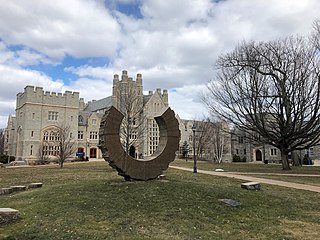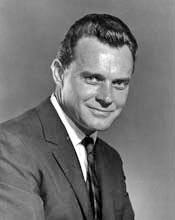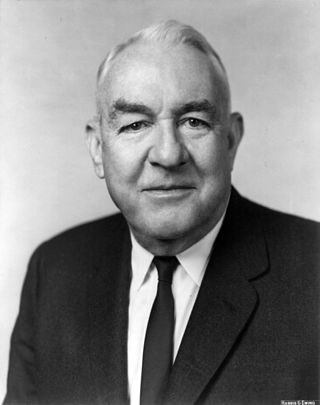Related Research Articles

Rocky Mount is a city in Nash and Edgecombe counties in the U.S. state of North Carolina. The city's population was 54,341 as of the 2020 census, making it the 20th-most populous city in North Carolina. The city is 45 mi (72 km) east of Raleigh, the state capital.
Willis Smith was an American attorney and Democratic U.S. senator from the state of North Carolina between 1950 and 1953.

Roy Asberry Cooper III is an American attorney and politician serving since 2017 as the 75th governor of North Carolina. A member of the Democratic Party, he served as the 50th attorney general of North Carolina from 2001 to 2017, and in the North Carolina General Assembly, in both the House, from 1987 to 1991, and the Senate, from 1991 to 2001.

Gordon Gray was an American attorney and government official during the administrations of Harry Truman (1945–53) and Dwight Eisenhower (1953–61) associated with defense and national security.

John Bennett Johnston Jr. is a retired American attorney, politician, and later lobbyist from Louisiana. A member of the Democratic Party, he served as a member the United States Senate from 1972 to 1997.

Woodward Academy is a private, co-educational college-preparatory school for pre-kindergarten to 12th grade on two campuses located in College Park and Johns Creek, Georgia, United States, within the Atlanta metropolitan area.

The University of Connecticut School of Law is the law school associated with the University of Connecticut and located in Hartford, Connecticut. It is the only public law school in Connecticut and one of only four in New England. As of 2020, it enrolled 488 students.

Harris Walter Fawell was an American lawyer and politician from Illinois who served seven terms as a Republican member of the United States House of Representatives from 1985 to 1999.

The South Carolina Republican Party (SCGOP) is the state affiliate of the national Republican Party in South Carolina. It is one of two major political parties in the state, along with the South Carolina Democratic Party, and is the dominant party. Incumbent governor Henry McMaster, as well as senators Tim Scott and Lindsey Graham, are members of the Republican party. Graham has served since January 3, 2003, having been elected in 2002 and re-elected in 2008, 2014, and 2020; Tim Scott was appointed in 2013 by then-governor Nikki Haley, who is also a Republican.

The speaker of the North Carolina House of Representatives is the presiding officer of one of the houses of the North Carolina General Assembly. The speaker is elected by the members of the house when they first convene for their regular session, which is currently in January of each odd-numbered year. Perhaps the most important duty of the speaker is to appoint members and chairs of the various standing committees of the House.

Benjamin Bentley Blackburn III was an American politician from Georgia. A member of the Republican Party, he served as member of the United States House of Representatives for four terms from 1967 to 1975. After he left the U.S. House of Representatives, his nomination to the Federal Home Loan Bank Board was rejected by the U.S. Senate. In the late 1970s and the early 1980s, he was the president of Southeastern Legal Foundation.

Elijah Longstreet Daughtridge was a North Carolina politician who served as the 12th Lieutenant Governor of North Carolina from 1913 to 1917.

Harvey Cloyd Philpott was an American businessman and politician who served as the 24th Lieutenant Governor of North Carolina in 1961. Philpott grew up in Lexington, North Carolina. Following the completion of his education, he rose to become president and chairman of the board of the United Furniture Corporation. He held several local political offices before being elected to a seat in the North Carolina House of Representatives in 1953 as a Democrat.

Richard Tillman Fountain was a North Carolina politician who served as Speaker of the North Carolina House of Representatives in 1927 and as the 16th Lieutenant Governor of North Carolina from 1929 to 1933 under Governor Oliver M. Gardner.

Samuel James Ervin Jr. was an American politician who served as a U.S. Senator from North Carolina from 1954 to 1974. A Southern Democrat, he liked to call himself a "country lawyer", and often told humorous stories in his Southern drawl. During his Senate career, Ervin was at first a staunch defender of Jim Crow laws and racial segregation, as the South's constitutional expert during the congressional debates on civil rights. However, unexpectedly, he became a liberal hero for his support of civil liberties. He is remembered for his work in the investigation committees that brought down Senator Joseph McCarthy in 1954 and especially for his leadership of the Senate committee's investigation of the Watergate scandal that led to the resignation of President Richard Nixon in 1974.
The Pearsall Plan to Save Our Schools, known colloquially as the Pearsall Plan, was North Carolina's 1956 attempt at a delayed approach to integrate their public schools after racial segregation of schools was ruled unconstitutional by the United States Supreme Court ruling Brown v. Board of Education (1954). Many southern states were challenged by the Brown ruling as they faced opposition to integration from residents.
References
- 1 2 3 4 5 Roff, Carol (1994). "Pearsall, Thomas Jenkins". NCPedia.org. State Library of North Carolina. Retrieved 23 August 2015.
- 1 2 3 4 5 6 7 8 9 10 11 12 13 14 15 16 17 18 "Collection Number: 04300: Collection Title: Thomas Jenkins Pearsall Papers, 1954-1979". The Southern Historical Collection at the Louis Round Wilson Special Collections Library. University of North Carolina Libraries. Retrieved 23 August 2015.
- 1 2 Lewis, George (August 2004). ""Scientific Certainty": Wesley Critz George, Racial Science and Organised White Resistance in North Carolina, 1954-1962". Journal of American Studies. 38 (2): 227–247. doi:10.1017/S0021875804008424. JSTOR 27557515. S2CID 145401901.